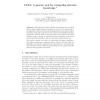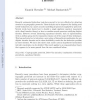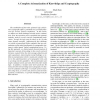27 search results - page 3 / 6 » Deciding Knowledge in Security Protocols Under Equational Th... |
137
click to vote
SP
2008
IEEE
15 years 7 days ago
2008
IEEE
e an abstraction of zero-knowledge protocols that is le to a fully mechanized analysis. The abstraction is formalized within the applied pi-calculus using a novel equational theor...
102
Voted
CORR
2010
Springer
15 years 1 months ago
2010
Springer
Type-flaw attacks and multi-protocol attacks on security protocols have been frequently reported in the literature. Heather et al. and Guttman et al. proved that these could be pr...
112
click to vote
RTA
2009
Springer
15 years 8 months ago
2009
Springer
Reasoning about the knowledge of an attacker is a necessary step in many formal analyses of security protocols. In the framework of the applied pi calculus, as in similar languages...
123
click to vote
IANDC
2008
15 years 1 months ago
2008
Recently automated deduction tools have proved to be very effective for detecting attacks on cryptographic protocols. These analysis can be improved, for finding more subtle weakn...
132
Voted
LICS
2007
IEEE
15 years 8 months ago
2007
IEEE
The combination of first-order epistemic logic and formal cryptography offers a potentially very powerful framework for security protocol verification. In this article, we addre...



